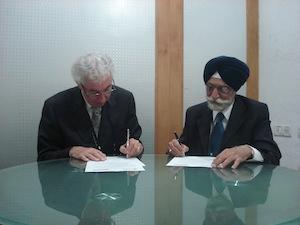* jointly-offered engineering programs News release UOIT President signs MOUs with two universities in India to develop jointly-offered engineering programs
November 11, 2010

OSHAWA, ON/DELHI, INDIA - The University of Ontario Institute of Technology (UOIT) has signed a pair of Memorandums of Understanding (MOU) with universities in India that will guide the development of jointly-offered engineering programs between the institutions.
The first MOU was signed Tuesday between UOIT and the Amal Jyothi College of Engineering, outlining an agreement to pursue the development of a jointly-offered Bachelor of Applied Science (BASc) in Nuclear Power degree. Dr. Ronald Bordessa, UOIT President signed the MOU in Delhi, India while visiting the country with 14 other Canadian university presidents. UOIT is part of the Association of Universities and Colleges of Canada's (AUCC) current delegation in India whose mission is to promote partnerships with Canada's higher education sector."This mission provides an important opportunity to broaden UOIT's international horizon," said Dr. Bordessa. "Durham Region has the potential to be Canada's nuclear energy capital and UOIT is a strong partner in helping to realize this vision. By forging new relationships with foreign academic institutions, we open doors both at home and abroad for students, faculty and our community partners."
Under the terms of the MOU, UOIT and Amal Jyothi will formally explore the creating of a 2+2 agreement for the BASc in Nuclear Power degree whereby Indian students will study the first two years of their program in India and complete the final two years of their degree at UOIT. The BASc in Nuclear Power was created for those working in the nuclear industry who do not have design responsibility. The degree provides the necessary science and basic engineering knowledge to perform roles such as control room activities, procurement and maintenance at nuclear power plants.
"We are very excited to develop this incredible opportunity for our students with UOIT," said Fr. Jose Kannampuzha, Principal of the Amal Jyothi College of Engineering. "India has the world's fastest-growing economy and we need to reach out to strategic international partners like UOIT to help us meet the increasing demand from our students for better opportunities in higher education."
UOIT's second MOU signing of the week happened today as Dr. Bordessa signed an agreement with Chitkara University to create BASc programs in the areas of electrical and mechanical engineering.
"Our agreement with UOIT lays the groundwork for outstanding new opportunities for our students as well as the advancement of international research collaboration," said Brig. R.S. Grewal, vice-chancellor, Chitkara University. "We warmly embrace this new direction and look forward to implementing this program over the next few years."
This week's MOU signings represent the second and third such agreements UOIT has developed in India. In April 2010, the first 2+2 agreement for the BASc in Nuclear Power was signed with the Indus Institute of Technology and Engineering in Ahmedabad, Gujarat, India. Once fully developed, these agreements could bring as many as 180 students from India to UOIT each year for study in these highly-specialized and sought-after fields of engineering. The first students from India, based on the MOU's, are expected to arrive at UOIT in the fall of 2012.
Characterized as an unparalleled innovation hub and emerging economic powerhouse, India achieved real growth of nine per cent per year between 2003 and 2007 and also posted substantial growth despite the global recession of 2009. This trend is driving demand for consumer goods in India along with the demand for access to post-secondary education. With India unable to meet this demand on its own, Canada's system of internationally-ranked universities which have much to offer India's higher education sector, has signalled it is ready to take up the challenge. The seven-day AUCC mission in India is the largest mission of university presidents in the history of the association. The Canadian delegation is pursuing opportunities in India to enrich experiences for students and strengthen post-secondary educational links between both countries.
The AUCC's vision of Think Canada, Think Canadian Universities highlights Canada as a study destination for quality learning and for innovative approaches to enhance the student experience by developing such initiatives as co-ops and internships. The mission maintains momentum following the Canada-India memorandum of understanding for education co-operation signed during Indian Prime Minister Manmohan Singh's visit to Canada in June and Prime Minister Stephen Harper's roundtable on higher education in November 2009.
About Ontario Tech University
A modern, forward-thinking university, Ontario Tech advances the discovery and application of knowledge to accelerate economic growth, regional development and social innovation. We inspire and equip our students and our graduates to make a positive impact in a tech-focused world. For us, it’s not only about developing the next tech breakthrough. Understanding and integrating the social and ethical implications of technology differentiates us as university. Learn more at ontariotechu.ca.
Media contact
Bryan Oliver
Communications and Marketing
Ontario Tech University
905.721.8668 ext. 2209
289.928.3653
bryan.oliver@uoit.ca



